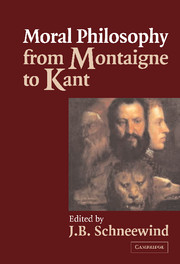Book contents
- Frontmatter
- Contents
- Preface
- Acknowledgments
- Foreword to the One-Volume Reprint
- Introduction
- PROLEGOMENA: SOME QUESTIONS RAISED
- PART I REWORKING NATURAL LAW
- PART II INTELLECT AND MORALITY
- PART III EPICUREANS AND EGOISTS
- Pierre Gassendi
- Pierre Nicole
- Bernard Mandeville
- John Gay
- Claude Adrien Helvétius
- Paul Henri Thiry, Baron d'Holbach
- William Paley
- Jeremy Bentham
- PART IV AUTONOMY AND RESPONSIBILITY
- Supplemental Bibliography
Jeremy Bentham
Published online by Cambridge University Press: 05 June 2012
- Frontmatter
- Contents
- Preface
- Acknowledgments
- Foreword to the One-Volume Reprint
- Introduction
- PROLEGOMENA: SOME QUESTIONS RAISED
- PART I REWORKING NATURAL LAW
- PART II INTELLECT AND MORALITY
- PART III EPICUREANS AND EGOISTS
- Pierre Gassendi
- Pierre Nicole
- Bernard Mandeville
- John Gay
- Claude Adrien Helvétius
- Paul Henri Thiry, Baron d'Holbach
- William Paley
- Jeremy Bentham
- PART IV AUTONOMY AND RESPONSIBILITY
- Supplemental Bibliography
Summary
Introduction
Born in 1748 into a prosperous middle-class family, Jeremy Bentham was sent to Oxford when he was only twelve (he never got over his dislike of, and contempt for, the mindless life there), and by the time he was twenty-one he was a full-fledged lawyer. Bentham did not intend to practice law; rather, he intended to provide a rational basis for law as a whole. He had a small private income and so was able to devote himself to his chosen task. In 1776 he published A Fragment on Government, which brought him to the attention of political leaders. Thereafter he mixed political activity with incessant writing, publishing much but writing so much more that neither he nor his many disciples and followers could prepare it all for the press during his lifetime. Books assembled from his manuscripts were translated into many languages, earning him honors abroad, and his practical projects and those of the Benthamites who worked with him earned him notoriety at home. One of his most devoted and most influential followers was James Mill, whose son John Stuart Mill was trained to be a Benthamite and at the age of seventeen edited a massive treatise by Bentham on constitutional law. Bentham died in 1832.
Bentham was a reformer, proposing changes in the laws of England, the courts, the colonial system, the Church of England, the schools, the banks, the prisons, and innumerable matters of daily life, ranging from grammar to sewage.
- Type
- Chapter
- Information
- Moral Philosophy from Montaigne to Kant , pp. 460 - 480Publisher: Cambridge University PressPrint publication year: 2002

